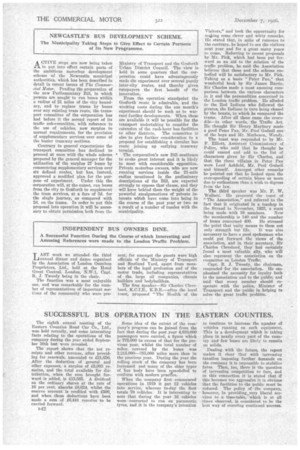NEWCASTLE'S BUS DEVELOPMENT SCHEME.
Page 68

If you've noticed an error in this article please click here to report it so we can fix it.
The Municipality Taking Steps to Give Effect to Certain Portions of Its New Programme.
A CTIVE steps are now being taken 21. to put into effect certain parts of the ambitious motorbus development scheme of the Newcastle municipal authorities, which has been described in detail in recent issues of The Commercial Motor. Pending the preparation of the new Parliamentary Bill, in which powers are sought to run buses within a radius of 21 miles of the city boundary, and to replace trams by buses over any existing tram route, the transport committee of the corporation has had before it the second report of its traffic sub-committee, with reference to the use of vehicles, now surplus to normal requirements, for the provision of supplementary services over some of the busier tramway sections.
Contrary to general expectations the transport committee has declined to proceed at once with the whole scheme prepared by the general manager for the utilization of the surplus 27 buses by commencing supplementary services over six defined routes, but has, instead, approved a modified plan for the purpose -of experiment. Under this the corporation will, at the outset, run buses from the city to Gosforth to supplement the tram services, at a fare of 3d. for the single journey, as compared with 2d. on the trams. In order to put this proposal into operation it will be necessary to obtain permission both from the
LAST week we attended the third annual dinner and dance organized by the Association of London Omnibus Proprietors, Ltd., held at the Hotel Great Central, London, NAVA, Capt. R. J. Tweedy being in the chair.
The function was a most enjoyable one, and was remarkable for the number of representatives of important sections of the community who were pre Ministry of Transport and the Cosforth Urban District Council. The view is held in some quarters that the corporation could have advantageously made the experiment over several purely inter-city routes, and thereby given ratepayers the first benefit of the innovation.
From the operation standpoint the Gosforth route is admirable, and the working costa during the one month's experiment should be such as to warrant further developments. When these are available it will be possible for the transport undertaking to consider the extension of the rush-hour bus facilities to other districts. The committee is also to give further consideration to a proposal for establishing a circular bus route joining up outlying tramway termini.
• The corporation's new Bill continues to evoke great interest and it is likely to meet with considerable opposition. Private motorbus owners, who are now running services inside the 21-mile radius mentioned in the preliminary descriptions of the Bill, axe expected strongly to oppose that clause, and they will have behind them the weight of the powerful amalgamations of private interests which have come into being in the course of the past year or two as a result of a number of tussles with the municipality.
sent, for amongst the guests were high officials of the Ministry of Transport and Scotland Yard, apart from members of the legal profession and of the motor trade, including representatives of the large oil companies, chassis builders and bodybuilders.
The first speaker—Sir Charles Cleveland, K.C.I.E., K.B.E.—after the loyal toast, proposed "The Health of the Visitors," and took the opportunity for melting some clever and witty remarks. Ile stated that, in spite of rumours to the contrary, he hoped to see the visitors next year and for a great many years to come. Referring to recent proposals by Mr. Pick, which had been put forward as an aid to the solution of the traffic problem, he said the Association believes that these and the scheme embodied will be satisfactory to Mr. Pick. Taking us a basis "Peter Pan," that wonderful book by Sir James Barrie, Sir Charles made a most amusing comparison between the various characters in it and the personalities concerned in the London traffic problem. He alluded to the Red Indians who followed the pirates, the Indians in turn being chased by the beasts, to which he compared the trams. After all these came the crocodile—in other words, the Traffic Act. He thought Sir Henry Maybury made a good Peter Pan, Mr. Pool GodselL1 one of the boys and Mr. Matheson, Wendy.
The toast was responded to by Mr. F. Elliott, Assistant Commissioner of Police, who said that he thought he could amend and add to the list of characters given by Sir Charles, and that the three villains in Peter Pan were Lord Ashfield, Mr. Pool Godsell and himself. Amongst other remarks he pointed out that he looked upon the over-speeding of certain bZi.ses as more due to enthusiasm than a wish to digress from the law.
The third speaker was Mr. F. W. Wallace. He proposed the toast of "The Association," and referred to the fact that it originated in a teashop in the Strand in November, 1923, a start being made with 19 members. Now the membership is 140 and the number of buses concerned 400. He stressed the point that unity means to them net only strength but life. It was also necessary to have a good spokesman who could put forward the views of the association, and in their secretary, Sir Charles Cleveland, they had certainly found a most valuable ally, who will also represent the association on the committee on London Traffic.
Capt. R. J. Tweedy, the chairman, responded for the associatiop. He emphasized the necessity for loyalty both to the association and to the public, and said that every member should cooperate with the police, Minister of Transport.and the public in helping to solve the great traffic problem.




















































































































